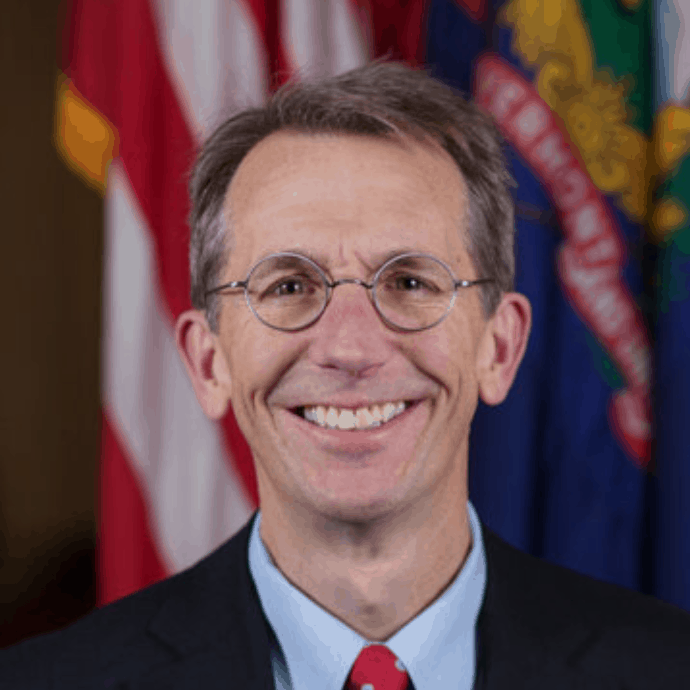
By Katy Savage
Rep. Charlie Kimbell, D-Woodstock, is campaigning to be the next speaker of the House after Mitzi Johnson, D-South Hero, lost her bid for reelection on Nov. 3.
Kimbell is a ranking member of the House Commerce and Economic Development Committee and represents Woodstock, Reading and Plymouth, which make up Winsor-5. He was first elected to the House in 2016.
He’s running to bring a more moderate political view and a focus on small towns to the position, he said.
“It occurred to me there was an opportunity to try to give the leadership in the House a more rural focus, a focus on the needs of small towns throughout Vermont,” he said.
Kimbell is among four candidates believed to be seeking the speakership position. Others include House Majority Leader Jill Krowinski (D-Burlington), the chair of the House Government Operations Committee Rep. Sarah Copeland-Hanzas (D-Bradford), and Cynthia Browning (D-Arlington).
Kimbell, who works in sales and marketing for Manufacturing Information Systems, Inc. in Woodstock, has long been active in town. He served two terms as Woodstock Village Trustee and was on the Woodstock Economic Development Commission before stepping down this year. Kimbell has also organized local events, including the popular Covered Bridges Half Marathon. Kimbell was the creator of the Prouty Ultimate, a 100-mile bike ride, and he started the Road to the Pogue, a 6.1 mile running race on Mt. Tom in Woodstock.
This summer, Kimbell was one of the organizers of the Woodstock Area Relief Fund, which raised about $600,000 for area residents to cover pandemic-related expenses.
Kimbell and his wife Carolyn also owned and operated Elevation Clothing in Woodstock for 11 years before they sold the business in July to their next-door neighbors.
“It was time,” said Kimbell, who has a new grandson. “My wife was ready to be done in the shop. It was perfect timing for us.”
As speaker, Kimbell would be in charge of assigning members to committees and managing the process of all legislation.
“Our focus has to be on Covid-19 and recovery from an economic and health basis,” Kimbell said. “We really have to continue that focus for the next few months.”
Kimbell is seeking the speaker position following a wave of leadership turnover in the Nov. 3 election. Sen. Pro Tempore Tim Ashe, D/P-Chittenden, won’t be returning to politics after he lost a bid for lieutenant governor to Molly Gray, a Democrat newcomer. Lt. Gov. David Zuckerman has also stepped out of politics after losing a bid for governor to incumbent Phil Scott.
Speaker Johnson lost her re-election bid to Republican challenger Michal Morgan by 18 votes. Results of a recount are expected Friday.
Browning, a longtime legislator from Arlington, said unlike Johnson she was still running for speaker, despite losing her seat. House rules do not prevent unelected members from holding the position.
“Some people have encouraged me, some people have discouraged me,” she said in a recent interview.
Browning lost by 540 votes to Seth Bongartz, who ran a joint campaign with incumbent Rep. Kathleen James, D-Manchester.
“I think the party made an effort to defeat me,” said Browning, who ran as an Independent.
Browning said Bongartz and James ran to oust her after she controversially called members of the House back to Montpelier in March to vote in person whether to allow remote voting.
Speaker Johnson disciplined Browning for putting people at risk in the pandemic by promptly removing her from the House Ways and Means committee. Johnson then left Browning committee-less for three months before appointing her to the Agriculture and Forestry Committee.
Browning called Johnson’s tactic a power move and pointed to broader leadership problems in the House.
Browning said House leaders use their votes in ways that benefit their positions in power, instead of benefiting constituents.
“I think that’s wrong,” Browning said. “I consider representing voters in a district to be a sacred obligation.”
Kimbell acknowledged pressure he felt after he, too, voted against his party.
Kimbell initially voted against a bill to raise the minimum wage last session until it was vetoed by the governor.
“The majority of my constituents would want me to vote for an increase to the minimum wage, and the caucus as well. From my own conscious, I didn’t agree with it,” Kimbell said. “I didn’t think that was a way to effectively increase people’s earnings.”
Kimbell eventually voted for the bill to override the veto.
“Do you vote for our constitutions, your conscience or your caucus? That’s politics,” Kimbell said.
Whoever becomes the new speaker will be responsible for leading the House in unprecedented times. The new session would start remotely for the first time.
“It’s unbelievable to accomplish what we’re able to do with Zoom, but I don’t think it’s the same,” Browning said. “This session the Legislature has to work together in a bi-partisan way, in a way that hasn’t been done before.”
Kimbell echoed those sentiments.
“It’s going to be a real challenge,” Kimbell said. “We have to work hard in the first few weeks of the session to make sure we take care of the new legislators. As much as you think you know the process, you don’t know until you get there.”
Kimbell also acknowledged the feelings of uncertainty across the nation.
“We need to do some healing, even at a local level, before we advance agenda items,” Kimbell said.
Kimbell was unsure how the state would recover from the pandemic.
“Financially we don’t know yet,” Kimbell said. “It’s going to be a real challenge to figure out how to fund the existing programs that we have in the state, which are very important to those people who are being served by them, with the existing revenue sources, which are taking a major hit right now.”
Attempts to reach the other speaker candidates, Krowinski and Copeland-Hanzas weren’t successful.



